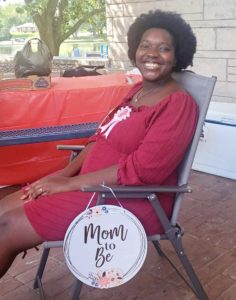In the last 20 months, the world has been impacted by COVID-19 in ways that we could have never imagined. We have all been faced with navigating through evolving information about our risks and how to protect ourselves and those we love. When it seemed like things were starting to return to normal earlier this year, the Delta variant emerged and presented new risks. Through this experience, we have learned, worried, doubted, felt anger, felt hope and we continue to make choices as we go through our daily lives. No doubt, we have all been changed.
As our communities continue to navigate through the pandemic, we have made choices about getting vaccinated, whether to gather with our families, when to wear a mask, and most recently, vaccinating our children. Often, the dialogue is politically fraught, and we may find ourselves wary of trusting the information we hear when it seems to constantly change. None of this is easy.
Navigating the pandemic is especially challenging for expectant Black parents and families who have or are preparing to welcome new life into a complex and challenging time on our planet. Becoming a parent comes with an entirely new set of decisions to make. Where will baby sleep? What will baby eat? Do I need childcare? Can I afford diapers? Layering in decisions about how to protect yourself and your new baby in this pandemic can make navigating these choices feel overwhelming.
We spent some time talking to a few of our FLOURISH community leaders about how they have approached making decisions for themselves and their families and their perspective on COVID-19 and the vaccine. Here’s what they had to say.
What did you think when you first heard that you would be eligible for the COVID vaccine?
Community Advisory Board member, Rosalyn shared that she was uncertain at how quickly the vaccine seemed to have been developed. She wonders how scientists fast-tracked the development of this vaccine when it seems we’ve made slower progress in finding cures for other diseases, like cancer or AIDS. Gennifer, a Community Advisory Board member, felt uncertain too. She and several members in her household have underlying health conditions and felt there was a lack of information about how her health condition might be impacted by the vaccine.
Rosalyn and Gennifer’s concerns matter. The singular message of “get vaccinated” by healthcare professionals dismisses other reasons why people may need more information to decide. America’s history of racism in medical research and healthcare has been a significant factor in the Black community’s response to getting vaccinated. No doubt, Black people are doing their research and thinking critically about what’s best for their bodies and weighing decisions against a system that historically has experimented upon and exploited Black bodies. Rather than dismissing these concerns, healthcare providers can connect with their Black patients to understand what additional information is needed, allow space for questions and respect their autonomy in making decisions.
What things did you consider when making the decision whether to get vaccinated?

Jessica from A Red Circle at her baby shower
Jessica, with A Red Circle, a FLOURISH grant partner, is pregnant and looked to her provider for information and has carefully considered the data available about the vaccine and what has been studied about the effects on pregnant people and their babies. Both Gennifer and Rosalyn also considered their families in their decision making. They worry about the safety of their children. Rosalyn, a single mom, worries about protecting her son and said she would feel devastated if she somehow exposed him to the virus. As her child’s primary caretaker, she understands that getting sick could have significant impacts on her family. Becoming ill or experiencing side effects from the vaccine, could mean time away from work, unpaid if the job does not offer sick time. Unpaid time off could leave her to fall short on meeting the month’s expenses. It could drive hard choices about whether to put food on the table or cover the rent and set off a chain reaction, weakening her family’s stability. The narrative that if you’re not vaccinated by now, then you must be actively against being vaccinated does not hold true when we consider the multitude of factors people are weighing about whether they can afford to get vaccinated and what the costs may be of their choice.
Who do you turn to for information to help you decide about whether or not to get vaccinated?
The American healthcare system’s historic exploitation and experimentation on Black bodies has yielded wariness and mistrust among many in the Black community. Our FLOURISH community leaders have felt that too. While they have assessed the data available, they still have questions and Rosalyn points out the difficulty of trusting the media for information. “I think the media wants us to be scared and anxious about this. It is difficult to know what information to trust when the information seems to change.” She urges people to feel comfortable with their choice and to feel fully informed before deciding because that decision could have significant impacts on one’s livelihood.

Consumer Advisory Board member, Gennifer
Gennifer said she talks with family and her neighbors and asks the administrators at her children’s school to help her weigh decisions about her family’s safety. There is a heaviness that comes with being responsible for making choices about other people’s bodies, and our leaders expressed the need to have people they could trust when they needed more information.
We here at FLOURISH want our community to be safe. We know Black caregivers and their families have choices to make about how to stay healthy and we urge healthcare providers to understand that Black patients are thinking critically about what’s best for their bodies and they deserve respect, understanding, and information to inform their choices.
Let’s disrupt the notion that unvaccinated means “anti-vaccination”, rather than “not yet vaccinated”. Healthcare providers must create space to build trust with their patients and understand that people are weighing their choices carefully. We believe that information is powerful. As new information becomes available and safety guidelines are updated, our team follows and trusts the information shared by these organizations.

